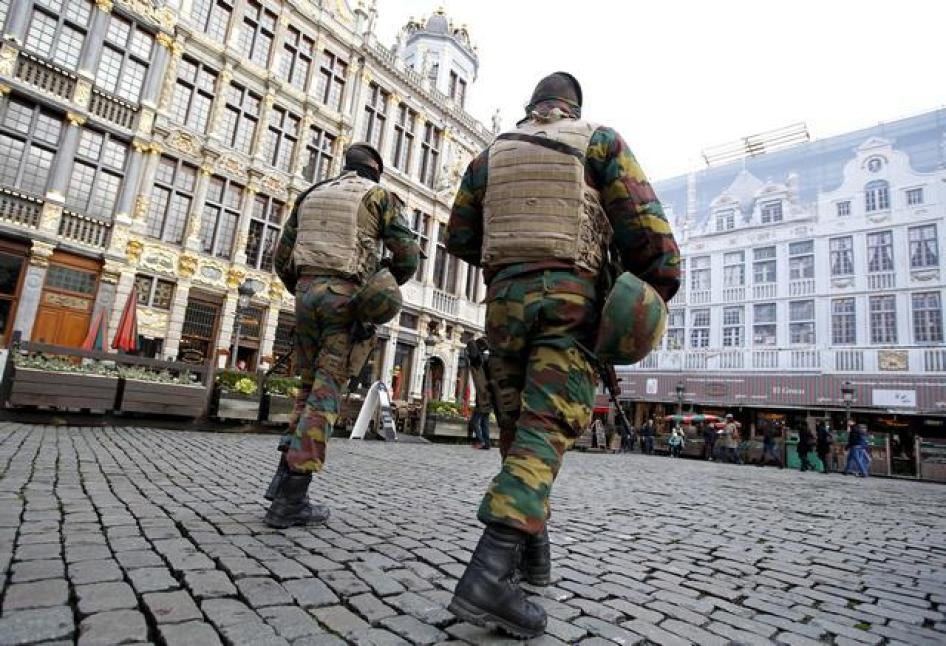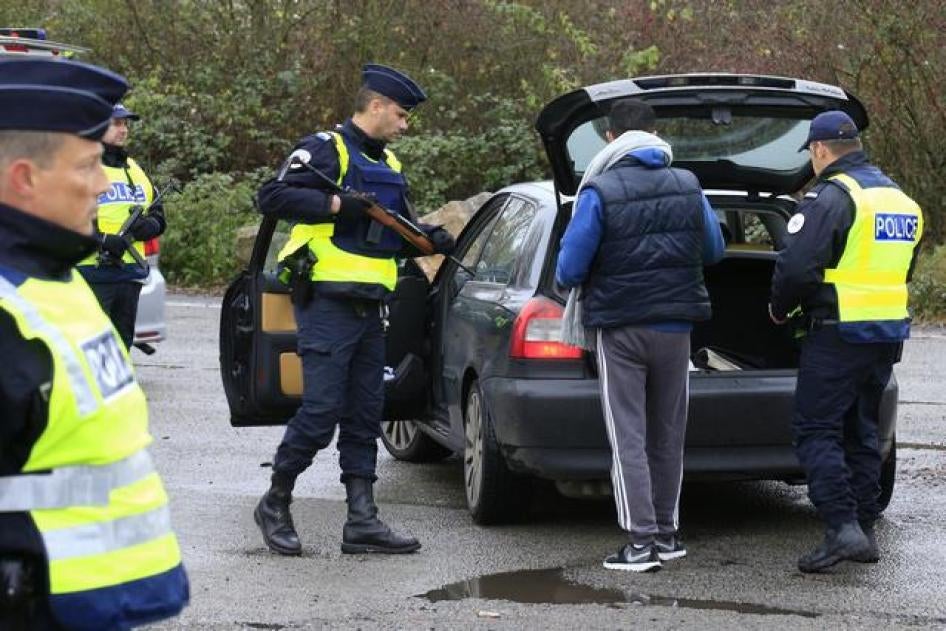The horrendous Paris attacks have provided certain European and U.S. politicians with an irresistible opportunity to attempt to close the door on refugees while seeking to expand overbroad government surveillance. It is important, out of principle and for our collective safety, to reject these appeals to fear and prejudice, as some political leaders have done.
A fake Syrian passport reportedly left behind by an attacker of unknown identity and nationality suggests that he entered Europe with the recent refugee flow. The presence of the passport may reflect a deliberate effort by the so-called Islamic State to stigmatize the people who dare flee its “caliphate.” It has led to a chorus of voices seeking to keep out refugees and asylum-seekers, despite the fact that theattackers identified so far have turned out to be citizens of Belgium and France.
The focus on refugees in the aftermath of the recent attacks is a dangerous distraction from Europe’s violent home-grown extremism. The roots of the problem are notoriously complex but relate in part to the social exclusion of past generations of immigrants — the persistent discrimination, hopelessness, and despair that pervades neighborhoods on the outskirts of certain cities.
How to remedy these serious social injustices should be a major part of today’s public debate, rather than the polarizing us-versus-them rhetoric we have heard so far. These communities — which, like all, are mainly law-abiding — should be embraced not only as citizens and long-term residents but as the people most likely to dissuade others from violence and report those who might resort to it. Tarring entire communities risks undermining their potential for cooperation with the police and could further alienate disaffected youth.
As for the refugees, their desperate flight from unending violence and abuse in places like Syria, Iraq, Afghanistan, and Eritrea, and their limited chance to live with assistance and dignity in neighboring countries, will lead many to Europe one way or another. The question is whether they will arrive in an orderly way that permits security screenings, or chaotically through the smugglers’ networks.
The effect of European policy so far has pushed refugees to risk their lives at sea for a chance at asylum. And with boats arriving helter-skelter across various Greek islands, there is little to stop a would-be terrorist from slipping in.
A safer and more humane alternative would be for the European Union to offer refugee resettlement and humanitarian visas from border countries like Turkey, Lebanon, and Jordan, as well as other places where refugees first congregate. With adequate support, the United Nations refugee agency or recipient countries could screen refugees for security risks, while Europe would signal that, because its doors will not abruptly shut, there is no need to pile onto shoddy boats to cross the Mediterranean.
Setting up processing centers in neighboring countries would also permit resettlement beyond Europe — in traditional recipient countries like the United States, Canada and Australia but also in the Gulf States and in Russia, both of which so far have refused to resettle any Syrians or others as refugees. Not everyone will opt for this more orderly process — nor should they be required to — but the option would help to reduce the irregular flow and make it harder for would-be terrorists to hide among the hundreds of thousands of asylum seekers currently overwhelming screeners on Europe’s southern shores.
The asylum-seekers who manage to enter via Greece or Italy face similar chaos if, as most do, they continue to make their way north. The sluggish implementation of an EU plan for organized relocation combined with beggar-thy-neighbor fences leads to the massive, uncontrolled flow of people that is a gift for those who want to evade law-enforcement scrutiny. Here, too, a more orderly process would permit more effective screening.
As for the United States, some politicians still object to admitting Syrian refugees despite the fact that the handful who arrive have gone through an invasive two-year screening process involving interviews, background checks, and biometric data — hardly an attractive route for would-be terrorists, who are more apt to use ordinary student or tourist visas.
Under the U.S. visa waiver program, Belgian or French citizens — which would include the Paris attackers — can enter the United States with significantly lower scrutiny. Currently, of all people entering the United States, refugees are the most heavily screened and vetted. But of course students and tourists are not as volatile a fuel for scare-mongering and demagoguery.
Beyond scapegoating the refugees, policymakers on both continents are using the Paris attacks to seek greater powers of mass surveillance beyond the already formidable powers that most governments exercise.
The CIA director, John Brennan, decried technical and legal restrictions on U.S. intelligence agencies’ ability to scoop up everyone’s private communications. Never mind that the only significant new legal restriction has been largely symbolic, withdrawing one legal basis for the mass collection of phone metadata.
But two independent oversight bodies with access to classified information concluded that such metadata had not been essential to foiling a single terrorist plot, despite the huge expense and enormous invasion of privacy.
The FBI director, James Comey, has also revived efforts to mandate “back doors” to the strongest forms of encryption that became prevalent following public dismay at revelations of U.S. mass surveillance. But there is no back door that only the good guys can exploit. Criminals would inevitably have a field day, and endanger critical infrastructure and confidential communications.
Some European officials, too, appear tempted by increased mass surveillance. France’s recent intelligence law has taken that approach by bolstering mass surveillance powers Yet in attack after attack in Europe, the perpetrators included people who were known to the police but not pursued due to lack of police resources. French President François Hollande has promised to add8,500 more law enforcement personnel to pursue leads. That seems a wiser course than investing in the accumulation of more mass data without the required means to follow up on the intelligence gathered.
When people feel threatened, some politicians are too willing to flout individual rights for the promise of a quick fix. We should learn from the calamitous U.S. response to the September 11 attacks. Discarding basic rights or scapegoating people of a certain religious or social profile does not only harm those directly implicated. It plays into the divisive and alienating response that terrorist groups want in order to generate more recruits. As painful experience has shown, the smart counter-terrorism policy is the rights-respecting one.
Kenneth Roth is executive director of Human Rights Watch. Follow him on Twitter: @KenRoth.











